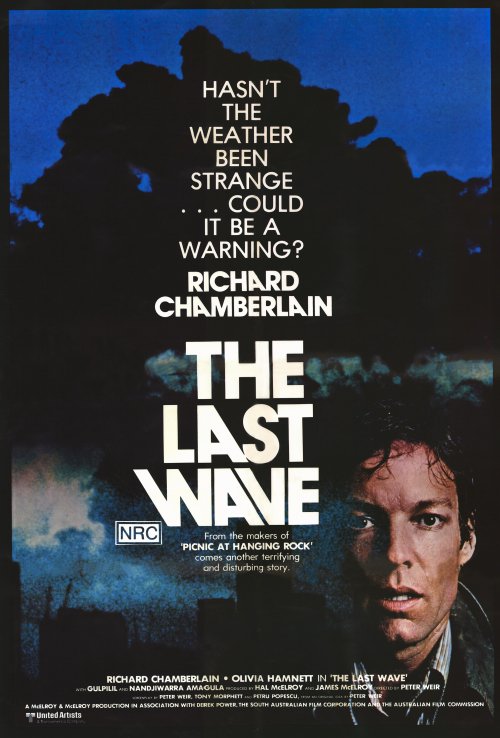

Last Wave, The (Peter Weir, 1977) prod. Jim & Hal McElroy, wr. Peter Weir, Tony Morphett, Petru Popescu, dp Russell Boyd, design Goran Warff, ed. Max Lemon, music Charles Wain, sound Don Connolly; Richard Chamberlain, David Gulpilil, Olivia Hamnett; thriller; Eastman colour, 35mm, 104 min.
This is still as impressive as on first release: effective, if a bit weird.
In the early days, Weir enjoyed starting with a 'What is' premise: What if people went to a drive-in cinema and found they couldn't leave? What if some schoolgirls simply disppeared while on a picnic? What if there were 'tribal' 'full-blood' Aboriginals in the heart of Sydney, still living according to the law? And what if it could affect whitefellas also?
Although Australian, Weir is a bit like the foreign directors who made the two great films of 1971, Wake in Fright and Walkabout, in that they saw aspects of Australian with fresh eyes (and used foreign actors in key roles). In this case, the central couple are played by an American actor and a British actress, and the Aboriginal actors are a long way from home.
The story is a fantasy, but based on questions which have become more lively since 1977, and are being asked on a daily basis: how should we invaders relate to the original inhabitants whom we dispossessed, and what should we be trying to learn from their traditional culture?
Stratton:
Looking back, Weir sees The Last Wave as, in some respects, his "roughest", "most awkward" film, but it's a film with a rare sense of mystery. Some critics, like Derek Malcolm in the Guardian, complained that Weir "manages only the most superficial commentary on Aboriginal culture which hinges more on mumbo-jumbo than fact and totally plays into the hands of those who persist in the assumption that we have to move back, not forward, to rediscover ourselves." in the same vein, Phillip Adams in his Bulletin column in April 1979, called the film "fatuous" and "silly" and took to task American critics for taking it seriously. This point of view fails to take into account Weir's fascination with the past as it affects the present, and totally fails to appreciate the mastery with which he juggles his mysterious forces to create one of the most affecting and least sensational mystery thrillers ever made. David Stratton: 79.
Garry Gillard | New: 16 November, 2012 | Now: 5 July, 2022